King Bhumibol Adulyadej’s passing away on 13 October 2016 brought to a close the reign of the world’s longest serving monarch. The ninth King from the Chakri dynasty, who was also known as Rama IX, ruled for seven decades (from 9 June 1946); this was a period when Thailand coped with major changes in post-World War II Asia, traversed the long path of the Cold War and then adapted to altered power equations in the 21st century.
Internally, the King presided over a nation that experienced both political turbulence and economic development. He was served by 30 prime ministers. Over a dozen military coups took place during his rule. At his demise, Thailand was under military rule, but was moving once again towards a democratic system, as outlined in a new constitution. The draft charter won the people’s support in the referendum, but it was yet to secure royal approval.
Despite the frequent change of governments, Thailand, with its $1.108 trillion (PPP, 2016) economy, growing at 2.8% (2015 estimate), is aptly considered one of the most prosperous nations in the ASEAN–and indeed East Asia.
The King’s stellar contribution was to provide a degree of continuity, stability and dignity to the political system. He was a skilful political figure, always anxious to balance diverging interests in order to preserve unity and order. He was the pillar of the Thai political establishment, but also close to the people, often travelling and interacting with them to listen to their problems and views. Development issues, in particular, interested him.
His death unleashed an outpouring of public grief, with huge masses of people thronging the Grand Palace complex in Bangkok where his body lay in state. Stores quickly ran out of black fabric as everyone seemed to need a suit or dress that befitted the mourning period.
World leaders paid rich tributes to the King. President Obama observed that he left “a legacy of care for the Thai people that will be cherished by future generations”. British PM Theresa May noted that he “guided the Kingdom of Thailand with dignity, dedication and vision throughout his life”. Russian President Putin stated that the King won the “sincere love of his people and high respect abroad”. Malaysian PM Najib Razak wrote on his Facebook page that King Bhumibol “was a towering presence whose contribution to Thailand, and the rest of the world, is beyond words”. Indonesian President Joko Widodo observed that the world lost a leader who was “close to his people, a carrier of peace and unity and prosperity for the people of Thailand”. PM Narendra Modi called him “one of the tallest leaders of our times”. According to Ban Ki-moon, UN secretary general, the King left “a legacy of commitment to universal values and respect for human rights.”
The royal cremation is still months away. And so is the coronation of the heir. It is interesting to note that Crown Prince Maha Vajiralongkorn, the King’s son and designated heir, requested that his ascension to the throne be delayed as he and the people were in mourning. For the interregnum, 96-year old Prem Tinsulanonda, former prime minister, general and head of the Privy Council, was appointed regent.
Ending weeks of speculation about the establishment having reservations about the Crown Prince, the interim parliament decided on November 29 to proclaim him the monarch of Thailand. To be known as Rama X, he will soon be invited to accept this grave responsibility. The latest information from Bangkok indicates that he may ascend to the throne in early December, but his coronation will take place only after the year-long mourning period is over.
In an objective, though sympathetic, assessment, Stephen B. Young argued that King Bhumibol faced “a more difficult challenge” than his grandfather, King Chulalongkorn or Rama V had: while King Chulalongkorn largely sustained the kingdom’s geographical integrity, King Bhumibol, facing intangible cultural pressures and crises of values and beliefs, upheld Thailand’s cultural and social integrity. “It is much harder to improve a people’s values than to build a bridge”, he observed.[1]
Not all evaluations of the monarch are infused with such sympathy and positivity, but Thailand’s laws about lèse-majesté are strict.
In a sensitive and imaginative gesture, Prime Minister Narendra Modi, en route to Japan, made a brief stopover at Bangkok on November 10. He laid a wreath and paid his respects to the late King. This reflected India’s close and special relationship with Thailand and the royal family since a long time. Heads of state and government from ASEAN countries have been quietly doing likewise.
It is puzzling that King Bhumibol Adulyadej never visited India—a topic that ought to whet the curiosity of researchers–but his children, including the Crown Prince, have. HRH Princess Maha Chakri Sirindhorn made the most number of visits—15 since 1987. She was in India again for a week in November 2016 when the first ‘World Sanskrit Award’ was conferred upon her.
It will do India good to nurture its links with the royal family, whose members will continue to exert considerable influence on Thai polity and society. India-Thailand relations have entered a positive phase with the successful visit to India by Prime Minister Prayut Chan-o-cha in June 2016. Historical and cultural ties, blended with tangible political and economic interests, have turned the two nations into close partners. The future of this partnership may, however, be moulded by larger regional dynamics.
Rajiv Bhatia is Distinguished Fellow Gateway House and former ambassador to Myanmar.
This blog was exclusively written for Gateway House: Indian Council on Global Relations. You can read more exclusive features here.
For interview requests with the author, or for permission to republish, please contact outreach@gatewayhouse.in or 022 22023371.
© Copyright 2016 Gateway House: Indian Council on Global Relations. All rights reserved. Any unauthorized copying or reproduction is strictly prohibited.
Reference
[1] Stephen B. Young, “Preserving Thailand: Achievements of King Bhumibol and King Chulalongkorn”, The Nation, 20 October 2016.


